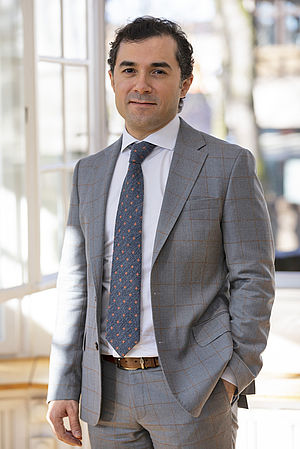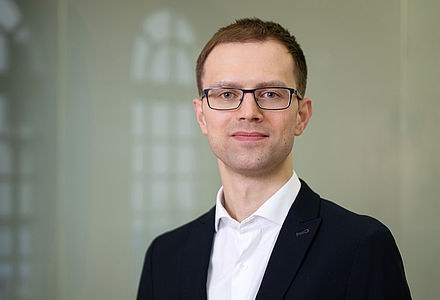Long-term effects of privatisation in eastern Germany: award-winning US economist begins large-scale research project at the IWH

Ufuk Akcigit (Photo: Victor Rubow)
The Halle Institute for Economic Research (IWH) is hosting the winner of the Max Planck-Humboldt Research Award 2019. Ufuk Akcigit, Professor of Economics at the University of Chicago, receives the award for his exceptional scientific achievements and outstanding potential. Under Akcigit’s leadership, a new research group at the IWH will use innovative methods to investigate why economic disparity still exists between eastern and western Germany 30 years after the fall of the Berlin Wall. Donated by the German Federal Ministry of Education and Research, the prize endowed with €1.5 million is considered one of the most prestigious awards in the German scientific community. Every year, it is jointly awarded by the Max Planck Society and the Alexander von Humboldt Foundation to a foreign researcher who then works in Germany for a certain period of time. The award ceremony will take place on 5 November 2019 in Berlin.
At the IWH, Ufuk Akcigit will have access to a unique database as well as decades of expertise in transformation research. He is planning three research projects, the first of which is both the most extensive and controversial. Using new, comprehensive data from companies and their managers, the privatisation of former GDR businesses by the Treuhandanstalt will be investigated. To what extent did the qualifications of the selected managers or their networking with other decision-makers play a role? Using a benchmark model, Akcigit aims to ascertain how eastern German firms would be performing today if exclusively the most talented entrepreneurs had been put in charge. In doing so, he will use an innovative approach that combines theory, empirics and computer simulations. Akcigit uses data at a micro level (firms, individuals, patents, ideas) in order to answer central macroeconomic questions with the help of a model estimation. This allows him to translate the microeconomic decisions of individuals into macroeconomic results, something considered one of the hardest tasks in Economics.
The second research project will analyse why highly innovative firms are established less frequently in eastern than in western Germany. In this context, it will also examine the role of migrants in economic growth and knowledge creation in Germany. Finally, the third research project will look for reasons for the slowing productivity growth in Europe using the IWH’s CompNet data.
On the awardee. Ufuk Akcigit’s work at IWH will build on his previous, internationally acclaimed research. The 39-year-old has already published an impressive dozen studies in the world’s top five journals on a wide range of fundamental economic questions. This is also reflected in several prestigious research awards and citations in leading global media. Akcigit studied Economics at Koç University in Istanbul and received his PhD from the Massachusetts Institute of Technology (MIT) in 2009. He was appointed tenured Professor of Economics at the University of Chicago this July.
“It's a unique benefit for the IWH that Ufuk Akcigit has chosen us as a partner,” says Reint Gropp, president of the IWH. “I warmly congratulate him on winning the Max Planck-Humboldt Research Award and very much look forward to working with him. I am extremely excited about having him at the institute, because his and our research agendas are a perfect match. Both Ufuk and the IWH conduct research on transformation, productivity, growth and innovation. Against the background of recent political developments in eastern Germany, it is even more essential to understand why productivity and thus incomes there are so stubbornly lagging behind progress in the west. If we better understand the context, we can better shape the future,” says Gropp. He adds: “The fact that we are conducting research with such a renowned award winner once again demonstrates the IWH’s impressive position in the German research landscape and the institute’s international impact.”
Matthias Kleiner, president of the Leibniz Association: “I’m delighted that Ufuk Akcigit has chosen the Halle Institute for Economic Research (IWH) as the host institution to undertake his research period as part of this extremely renowned research award. I warmly congratulate him on behalf of everyone at the Leibniz Association. The IWH is an excellent choice as evidenced by the recent evaluation of its outstanding scientific quality. Understanding the economic differences between eastern and western Germany is still highly relevant three decades after the fall of the Berlin Wall. Therefore, it comes as no surprise that the IWH in Halle is researching this and implementing the findings in evidence-based policy advice, in accordance with its Leibniz Institute mandate – for the benefit of society. This is precisely where I expect creative momentum from Ufuk Akcigit’s work at and with the IWH.”
Whom to contact
For Researchers

President
If you have any further questions please contact me.
+49 345 7753-700 Request per E-MailFor Journalists

Internal and External Communications
If you have any further questions please contact me.
+49 345 7753-832 Request per E-MailIWH list of experts
The IWH list of experts provides an overview of IWH research topics and the researchers and scientists in these areas. The relevant experts for the topics listed there can be reached for questions as usual through the IWH Press Office.



